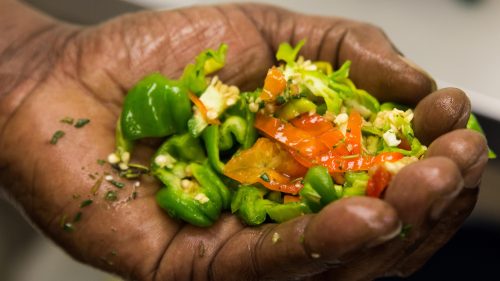By Daphnée Lacroix and Will Lofsky
The newest version of Canada’s Food Guide encourages a vegetarian and vegan diet and using more plant-based proteins.
Released on Jan. 22, the new guide recommends more vegetables, fruits and whole grain foods. It also encourages Canadians to avoid saturated fats and processed foods, and to replace sugary drinks with water. The guide also includes guidelines for healthy eating habits.
“Though we are glad that Canada’s Food Guide now reflects a more diverse range of dietary needs and preferences, we hope this will trickle down to individual values and desires,” Ryerson Eats said in a statement, when asked if they would change their menu to reflect the updated guide.
Debbie Field, distinguished visiting practitioner at the Centre for Studies in Food Security at Ryerson University, works with several dieticians in the department who she said support the new changes.
Field has been working with students on an audit of campus food, which was brought forward in a motion approved by the Ryerson Students’ Union (RSU) at their last semi-annual general meeting.
“There’s no question the food guide has implications for what is served on campus,” said Field.
Though we are glad that Canada’s Food Guide now reflects a more diverse range of dietary needs and preferences, we hope this will trickle down to individual values and desires
In their statement, Ryerson Eats called the new food guide a step in the right direction.
“If each Canadian made it a goal to have more plant-based meals, reduce refined carbohydrates and sugar and were able to deliver on that commitment, it would no doubt positively impact the health of our society and planet,” they said.
Ryerson Eats said they currently provide vegan, vegetarian, halal and made-without-gluten options in cafeterias in Pitman Hall, the International Living and Learning Centre, the Hub Café and coffee kiosks around campus.
They added they will continue to work to promote meat substitutes, ensure vegan or vegetarian options are highlighted, label meals so people know what is in them and populate spaces with “build your own” stations so students can customize their meal.
Mia Vos, a fashion communication student at Ryerson, said being vegetarian for two and a half years and vegan for six months helped her get rid of her iron deficiency.
“My iron levels were way lower when I ate meat and once I became vegetarian it got a lot better,” Vos said. “My experience with cutting out dairy was great. It helped my skin a lot at the time and I had stomach issues and they got better when I started to lessen my dairy intake.”

However, not all students are open to changing their eating habits.
Mackenzie Henrique, a business technology management student at Ryerson, said he doesn’t plan on reducing her meat intake but is actively trying to limit his dairy consumption. “I like the taste of meats and have never noticed having an upset stomach after eating them, but I do with dairy.”
It can be difficult to change food habits, according to Rena Mendelson, a professor in the school of nutrition at Ryerson.
“Typically the advice is taken up by people with a keen interest, capacity and motivation to maintain their health,” said Mendelson. “Hopefully the health behaviours will spread to others in a way that is similar to the spread of other voluntary social changes—like the use of mobile devices.”
According to David Ma, a professor in the department of human health and nutritional sciences at the University of Guelph, the previous food guide was complicated and inaccessible.
“Most Canadians were not able to use the guide because of a lack of understanding of serving sizes and focus on nutrient requirements,” said Ma.
“Making the food guide more user friendly is a huge change and improvement.”










Leave a Reply